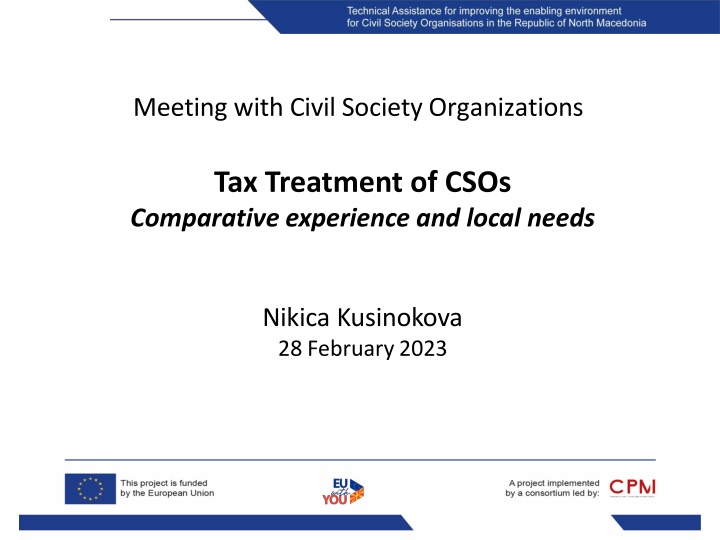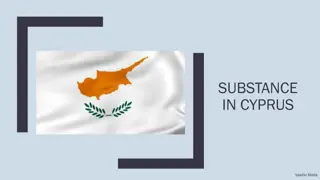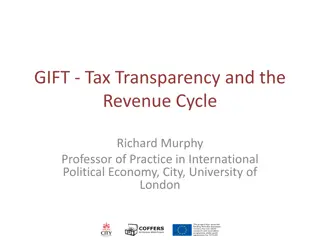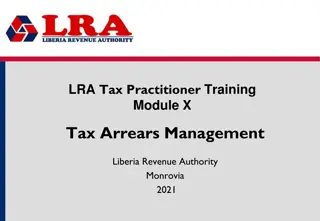Tax Treatment of Civil Society Organizations: Comparative Experience
Meeting with Civil Society Organizations explores the tax treatment of CSOs in the European Union and Western Balkans, emphasizing the importance of favorable fiscal frameworks for sustainability and the diverse approaches to income taxation.
Download Presentation

Please find below an Image/Link to download the presentation.
The content on the website is provided AS IS for your information and personal use only. It may not be sold, licensed, or shared on other websites without obtaining consent from the author.If you encounter any issues during the download, it is possible that the publisher has removed the file from their server.
You are allowed to download the files provided on this website for personal or commercial use, subject to the condition that they are used lawfully. All files are the property of their respective owners.
The content on the website is provided AS IS for your information and personal use only. It may not be sold, licensed, or shared on other websites without obtaining consent from the author.
E N D
Presentation Transcript
Meeting with Civil Society Organizations Tax Treatment of CSOs Comparative experience and local needs Nikica Kusinokova 28 February2023
Same, but different Why a different tax treatment? Dynamic and sustainable civil society Independence and non-profit nature continuous challenge to provide for financial sustainability Specifics and role Favorable fiscal and tax framework key to CSOs sustainability Specifics of the tax treatment of CSOs in the European Union: Similar tax principle and approach in different EU countries Various concrete tax solutions Depends on the existing legal and tax system Diverse directions and traditions for development of the CSOs, different forms of CSOs Diverse philanthropic traditions 2
Key aspects of the tax treatment of CSOs Balance between taxation of profit entities, hybrid forms,protection of competition and the State budget CSOs contribute to, and serve for the broad public benefit and wellbeing a key argument for the tax benefits for CSOs All registered CSOs or CSOs for public benefit PB Status of the CSOs: broad and narrow scope Public benefit objective: generally defined or limited to specific areas Foundations only for public benefit or also for private Possibility for different treatment of associations compared to foundations, depending on the regulation 3
Comparative experience from EU and Western Balkans Membership fees, donations, gifts, grants, investment income and interest, income from economic activities related or non-related to the mission, etc. Mostly regulated with the profit tax legislation or related regulations Unified good practice: tax exemptions for donations and grants (philanthropic or public) except Denmark and Norway Different approach in taxation of economic activities (profit- oriented activities) 5
Comparative experience from EU Economic activities (economic activities,profit-oriented activities) Types of economic activities allowed to CSOs Allowed in almost all countries, although in some with certain restrictions Only mission related they must support and be related to the public benefit objectives of the CSOs (Austria, Bulgaria, Greece, Hungary, Spain, Romania, all countries of WB, etc.) They may be ancillary, secondary to other commercial sources of funding (Austria, Belgium, France, Czech Republic, Italy, Poland, etc.) Liberal approach which allows any economic activity (Germany, Croatia, the Netherlands) Income taxation of economic activities Predominantly, income from investments in shares, bonds and similar investments are not treated as an economic activity and are not subject to tax Tax exemption with restrictions 6
Comparative experience from EU Economic activities (economic activities, profit-oriented activities) Taxation of income from economic activities Mostly income from investments in shares, bonds, etc., not treated as an economic activity and it is not subject to taxation Tax exemption with some restrictions: - The income from mission related activities is not subject to taxation, while the income from non-mission related activities is subject to profit income tax - Restrictions for the amount of this type of income which is exempted from taxation - Taxation of all income from economic activity - Tax exemption of the total income, except if it would result in unfair competition 7
Examples CROATIA SLOVENIA NETHERLANDS FRANCE GERMANY Liberal approach to income from economic activities - Any economic activity is allowed - Taxation applicable only if the organization have an unjustified benefit market. In such case profit tax of 12%- 18%, depending on the amount of the income Any economic activity is allowed, regardless whether related to the mission or not. CSOs only for public benefit - exempted from all corporate taxes Liberal approach - Any activity is allowed - The activity is not subject to tax if it is necessary for the mission and it does not create significant competition - If the activity is not related to the mission, it is exempted from tax up to an amount of 35.000 EUR, depending whether used for public benefit Liberal approach to economic activities - Any activity is allowed - They are exempted from taxation if the surplus of income from these activities is under15.000 EUR per annum or less than 75.000EURin the last 4 years. Allowed economic activities if they are clearly stated in the statutory documents, and if they are mission related. Income from economic activities subject to tax and it must be reinvested in the statutory activities the CSO is They are not subject to taxation if related to the mission and if it is a secondary income (max. up to 72.000 EUR). Over 72.000 eur they may be exempted from tax if they are not competition to the companies and if they satisfy market demand that is not otherwise fulfilled. might on the is of 8
Regulation in North Macedonia Income from donations and grants is not subject to taxation Allowed economic activities if they are related to the statutory objectives of the organization CSOs are exempted from profit taxation, except in cases when the income from economic activity may lead to unfair competition Income from economic activity above 1 million MKD annually is subject to 1% tax to the amount exceeding the threshold 9
Questions for discussion What is the existing experience in the implementation of the legislation on income tax? Is the legislation clear? Does it encourage the CSOs to generate own income from economic activities (including non-mission related activities)? Is the existing tax treatment appropriate compared to the treatment of the commercial entities? 10
Comparative experience from EU and Western Balkans Two aspects of VAT: Input VAT when CSOs purchase goods and services Output VAT when CSOs are providers of goods and services (VAT payers) In principle, CSOs pay input VAT Similar treatment as with the companies if they are payers of VAT Sometimes the services provided by CSOs are also exempt from VAT, consequently: Input VAT burdens the CSOs There are rare cases of introducing mechanisms for returning input VAT by CSOs 12
Examples SLOVENIA CROATIA IRELAND FRANCE GERMANY Output VAT: - CSOs services for members are exempt from tax if they pay membership fee, or if they pay for the real cost of the service. Applicable only if the tax exemption does not hinder fair competition - VAT rates: 25%, 13% and 5% Output VAT: - Certain goods and services relevant for the CSO are subject to lower tax rate of 10% (standard is 20%) - If the funds are used both for profit and non- profit activities, VAT exemption is calculated ratio of VAT income exempt and non- exempt activities Output VAT: - VAT exemption for public benefit services: health, education, cultural, scientific. - Preferential VAT rate for CSOs working only for the public benefit, charities, religious objectives - If the activity subject to VAT is part of these statutory objectives, it will be subject to preferential rate of 7% (the standard rate is 7%) Input VAT: -Compensation plan for certain CSOs (charities) -Refund of part of VAT paid in the previous year if they had not claimed it in an other manner -Only for expenses related to their charity/activi ties up to 5 mill. Euros annually - VAT refund when they purchase specific equipment (medical, rescue) Output VAT: - Exemption of certain services provided by SCOs: services for members paying membership fee, sporting services and physical culture provided by non-profit organizations, goods and services related to charities (and not commercial ones for gaining profit) Input VAT: Exempt for import of goods intended for non- profit objectives to the 13
Regulation in North Macedonia Input VAT Mandatory for CSOs, with two exceptions: Goods and services procured in projects by international institutions including co- funding from the Budget under the decentralized IPA, however, not the share of CSOs in the projects According to the Law on donations and sponsorships, for donations by individual and corporate donors. Also applicable for monetary and in-kind donations Output VAT There is no preferential treatment for the goods and services by CSOs VAT exemption for certain services in the field of culture, health, the social sphere CSOs become VAT payers when their annual income from economic activity subject to VAT shall exceed the threshold of 2 million MKD. 14
Questions for discussion What is the existing experience in the implementation of the VAT legislation? Are CSOs facing challenges in its implementation and how these challenges can be overcome? Can the VAT treatment of CSOs be improved by alleviating the financial burden of the input VAT in particular for the small CSOs etc.? 15
TAX INCENTIVES ON PHILANTHROPIC GIVING
Comparative experience from EU and Western Balkans Tax benefits for individual and corporate donors Almost all countries provide for tax incentives VAT on donations Certain incentives on donated goods and services VAT exemption for SMS donations Tax on gifts and inheritance CSOs with public benefit status are exempt from this tax in almost all EU countries In Croatia, only humanitarian and the Red Cross; in Bulgaria for inheritance up to 125.000 EUR. International philanthropy Free movement of capital, consequently applicable to donations Tax exemption for donors to comparatively similar CSOs in the EU Challenge for most EU countries 17
Tax benefits for individual and corporate donors Two basic models: Tax reduction (from the principal) - predominant Tax credit (from the tax) Hybrid approach (depending on the type of donor) Broad spectrum of criteria and levels: Subject of donation:financial and non-financial (establishing the value) Eligibility of recipients: PBOs or PB activities Restricting the amounts of tax exemption: % of the income subject to taxation, from the profit, from the total turnover or income, from tax Restricting the amount of the donation eligible for tax exemption:% of the donation Eligibility of donations based on their size ( from smallest to biggest) Use of special donating tools 18
Examples SLOVENIA CROATIA NETHERLANDS FRANCE GERMANY -Corporate: tax reduction, 2% of the total income -Individual: tax reduction, 2% of the income subject to tax. It is not applicable to non- financial donations -For public benefit activities per areas; there is no separate procedure - There are not any additional obligations for reporting - Non-financial donations are being documented with delivery note or other donation receipt - Corporate: Tax credit, up to 60% of the donation, 0.5% of the annual income, forward up to 5 years. - Individual: tax credit,up to 66% of the donation, up to 20% of the taxable income - No special obligations for reporting for donors.In addition to the annual account, CSOs must also submit Tax Return -Corporate: tax reduction up to 20% of the annual taxable income. Alternately, up to 0.4% of the annual turnover and salaries.May be carried forward in the upcoming years. - Individual: tax reduction,up to 20% of the annual taxable income. - To CSOs with PBO status - Standard annual reporting - Corporate: tax reduction, up to 50% of profit, or up to100.000 EUR - Individual: Tax reduction, from 1%-10%from gross income. Cannot be used for donations under1% or 60 EUR - For donation of at least 5 years up to 100% of income - For particular topics (culture) from 125%- 150% to maximum additional 2500 EUR -Corporate: tax reduction,0.3% of the taxable income. Additional 0.2% for culture-related objectives, protection natural and other disasters. forward years - Individual: tax designation (referral), 0.5% of tax (to 5 entities). - Standard annual reporting carried for against Carried three in 19
Additional aspects Food donations: VAT exempted when donated to food banks or similar organizations under certain conditions Some countries have prescribed legislative provisions (limiting the value of donated food, etc.) EU guidelines for food donation Procedure and Information on tax incentives: In all EU countries eligibility is exhibited ex-post after giving Different procedures: Upon request by the tax authorities(The Netherlands) Proof of donation along with the Tax Return (Germany,Czech Republic, Poland, etc.) List of donations within the year(Poland) There are no special obligations for reporting with donors, except for the Tax Return For CSOs, in certain countries they are obliged to submit a list of donations over a threshold amount (Poland) 20
Regulation in North Macedonia Law on donations and sponsorships in public activities For financial and non-financial donations Broad scope of recipients Corporate donors: tax reduction up to 5% of the total annual turnover for donations, and up to 3% for sponsorships Individual donors: tax credit up to 20% of the annual personal income tax, not more than 24.000 MKD VAT exemption for SMS donations and tickets for charities Exemption from taxes on inheritance and property tax(5 years.) Burdensome administrative procedure with ex-ante contract for donation and certificate from the Ministry of Justice Facilitating the procedure during the pandemic for donations to institutions, but not to CSOs Law on Profit Tax corporate donors in sports; tax credit and up to 50% of the profit tax 21
Questions for discussion What is the existing experience from the implementation of the tax incentives on the philanthropic giving? Are the CSOs experiencing challenges in their implementation and how to mitigate those challenges? Can the tax incentive be improved? Is there a need for additional tax benefits on donations to CSOs with Public Benefit Status (PBO status), multi-year donations etc.? 22
Thank You! Nikica Kusinikova 070 333482 23



![Town of [Town Name] Real Estate Tax Rates and FY 2024 Budget Summary](/thumb/62211/town-of-town-name-real-estate-tax-rates-and-fy-2024-budget-summary.jpg)



















